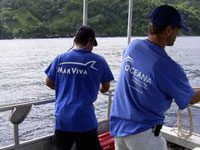February 26, 2005
Golfito, briefly. Saturday, February 26th 2005
We’re back in Golfito for a few days to restock, shower, and get information about Cocos Island out to the wider world. Today we held a joint Oceana/MarViva press conference at the MarViva base. A bus brought the audience of journalists and cameramen from San Jose.
Xavier told the story of Cocos, which by now is familiar to s ome of us but no less impressive. It basically runs thus: Until very recently Cocos was a wilderness apart. It was a haven for pirates and the occasional whaler, but otherwise unvisited and unknown. In the 1970s, however, nearshore fisheries were rapidly depleted and fishing fleets began to frequent the island in force. Costa Rica declared Cocos and 12 miles of the surrounding ocean a national park (1978); UNESCO named it a World Heritage Site (1997), but the designations were meaningless in practice, industrial fishing continued on a large scale, and one of the planet´s most extraordinary marine treasures slipped into decline. It was only with the creation of MarViva and collaborative patrols, in 2002, that things began to change. And change they did.
ome of us but no less impressive. It basically runs thus: Until very recently Cocos was a wilderness apart. It was a haven for pirates and the occasional whaler, but otherwise unvisited and unknown. In the 1970s, however, nearshore fisheries were rapidly depleted and fishing fleets began to frequent the island in force. Costa Rica declared Cocos and 12 miles of the surrounding ocean a national park (1978); UNESCO named it a World Heritage Site (1997), but the designations were meaningless in practice, industrial fishing continued on a large scale, and one of the planet´s most extraordinary marine treasures slipped into decline. It was only with the creation of MarViva and collaborative patrols, in 2002, that things began to change. And change they did.
As Xavier said, “The ongoing work around Cocos shows that professional partnership and loyal cooperation between governments, private companies, and NGOs gives results very quickly. In three years MarViva has done a number of important things here, and if we could copy and paste this approach in other parts of the world it would be one very good way to change the situation in the oceans.”There is, of course, still work to be done. Longliners linger at park borders, waiting for a chance to enter and willing to risk arrest – perhaps a further demonstration of continuing fisheries depletion closer to shore, perhaps testament to the success of the Cocos project in restoring the island’s remarkable marine abundance, or perhaps some combination of both.
There were four organizations represented at the conference. Xavier Pastor, director of Oceana Europe; Micheal Rothchild, executive director of MarViva in Costa Rica; and Juan Pablo Camblor, director of Zoea, in Spain, all spoke. Mar Mas, founder and president of Kaisut Media and chief videographer of the Ranger expedition, had compiled a video of footage from Cocos, which we watched. It is easy when you are sailing, diving, filming to get lost in the details of the work, but here was its sum – four organizations pursuing a coordinated effort to assess the status of some of the most extraordinary areas of ocean in the world, and to convey to a broader public a vision of what the oceans are and can be. It was good to be in the audience, a thrill to see the pieces falling into place.

